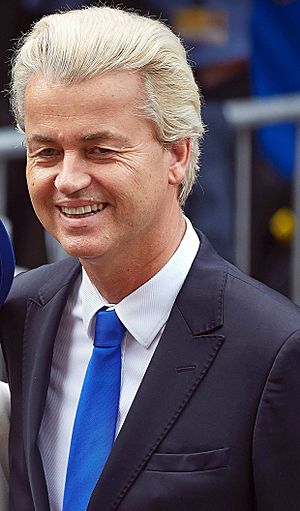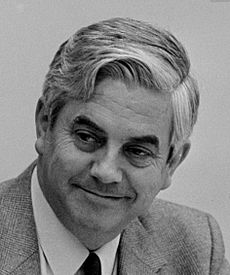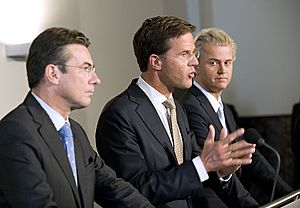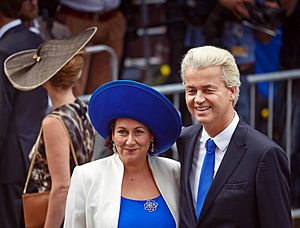Geert Wilders facts for kids
Quick facts for kids
Geert Wilders
|
|
|---|---|

Wilders in 2014
|
|
| Leader of the Party for Freedom | |
| Assumed office 22 February 2006 |
|
| Preceded by | Position established |
| Leader of the Party for Freedom in the House of Representatives | |
| Assumed office 23 November 2006 |
|
| Preceded by | Position established |
| Member of the House of Representatives | |
| Assumed office 26 July 2002 |
|
| In office 25 August 1998 – 23 May 2002 |
|
| Personal details | |
| Born | 6 September 1963 Venlo, Netherlands |
| Political party | PVV (2006–present) |
| Other political affiliations |
|
| Spouse |
Krisztina Márfai
(m. 1992) |
| Parents | Johannes Henricus Andreas Wilders, Maria Anne (Ording) Wilders |
| Residence | The Hague |
| Alma mater | Open University |
Geert Wilders ( born 6 September 1963) is a Dutch politician who has led the Party for Freedom (PVV) since he founded it in 2006. He is also the party's leader in the House of Representatives, having held a parliamentary seat since 1998. Wilders is best known for his criticism of Islam and the European Union (EU); his views have made him a controversial figure in the Netherlands and abroad.
Contents
Early life and career

Wilders was born on 6 September 1963 in the city of Venlo, in the province of Limburg, the son of Johannes Henricus Andreas Wilders and Anne Maria (Ording) Wilders. He is the youngest of four children, and was raised Catholic. His father was Dutch; his mother was born in colonial Indonesia with a mixed Dutch and Indonesian background. His father worked as a manager for the printing and copying manufacturing company Océ, and had hidden from the Germans during the Second World War, an experience so traumatizing that he refused to physically enter Germany even forty years later.
Wilders received his secondary education at the Mavo and Havo middle school and high school in Venlo.
Wilders' goal after he graduated from secondary school was to see the world. Because he did not have enough money to travel to Australia, his preferred destination, he went to Israel instead and volunteered for a year in a moshav, Tomer, on the West Bank. With the money he saved, he travelled to the neighbouring Arab countries, and was moved by the lack of democracy in the region. When he returned to the Netherlands, he retained Israeli ideas about counter-terrorism and a "special feeling of solidarity" for the country.
Living in Utrecht, Wilders initially worked in the health insurance industry. His interest in the subject led him into politics as a speech-writer for the Netherlands' People's Party for Freedom and Democracy. He started his formal political career as a parliamentary assistant to the party leader Frits Bolkestein, specialising in foreign policy. He held this job from 1990 to 1998. During this time Geert Wilders travelled extensively, visiting countries all across the Middle East, including Iran, Syria, Jordan, Egypt and Israel. Bolkestein was the first Dutch politician to address the consequences of mass immigration for Dutch society, including a sharp criticism of Muslim immigrants. He set an example for Wilders not only in his ideas but also in his confrontational speaking style. Political analyst Anno Bunnik later described Wilders as a "sorcerer's apprentice" to Bolkestein.
Political career
In 1997, Wilders was elected for the People's Party for Freedom and Democracy (VVD) to the municipal council of Utrecht, the fourth largest city of the Netherlands. A year later, he was elected to the Netherlands' national parliament. After his appointment in 2002 as a public spokesman for the VVD led Wilders to become more well known for his outspoken criticism of Islamic extremism. Tensions immediately developed within the party, and in September 2004 Wilders left the VVD to form his own political party, Groep Wilders, later renamed the Party for Freedom. The Party for Freedom calls for tax reduction, investing more in roads and other infrastructure, building nuclear power plants and including animal rights in the Dutch constitution. In the 2006 Dutch parliamentary election, their first parliamentary election, the Party for Freedom won 9 out of the 150 open seats.

In the parliamentary elections on 9 June 2010, the PVV increased its number of seats from 9 to 24 (out of 150), getting 15.5% of the vote. This made the PVV the third party in size.
In the 2021 Dutch general election the PVV received 10.79% of the total votes cast. This earned them 17 seats in the House of Representatives.
Political positions
Political principles
Wilders views British Prime Minister Margaret Thatcher as his greatest political role model.
Wilders strongly opposes the Dutch political system in general. He published the version of his political manifesto called Klare Wijn ("Clear Wine") in March 2006. The program proposed the implementation of ten key points:
- Considerable reduction of taxes and state regulations;
- Replacement of the present Article 1 of the Dutch constitution, guaranteeing equality under the law, by a clause stating the cultural dominance of the Christian, Jewish and humanist traditions;
- Reduction of the influence of the European Union, which may no longer be expanded with new member states, especially Turkey; the European Parliament would be abolished; Dutch financial contributions to the European Union would be reduced by billions of euros;
- A five-year moratorium on the immigration of non-Western foreigners who intend to stay in the Netherlands; foreign residents no longer would have the right to vote in municipal elections;
- A five-year moratorium on the founding of new mosques and Islamic schools and a permanent ban on preaching in any language other than Dutch; foreign imams would not be allowed to preach; radical mosques would be closed, and radical Muslims would be expelled;
- Restoration of educational standards, with an emphasis on the educational value of the family;
- Introduction of binding referendums and elected mayors, chiefs of police, and prime ministers;
- Introduction of minimum criminal penalties and higher maximum penalties; introduction of administrative detention for terror suspects; street terrorism would be punished by boot camps and denaturalisation and deportation of immigrant offenders;
- Restoration of respect and better compensation for teachers, policemen, health care workers, and military personnel;
- Instead of complicated reorganisation, a more accessible and humane health care system, especially for elderly citizens.
Personal life
Wilders is married to Krisztina Wilders (née Márfai), a former diplomat from Hungary of Jewish origin.
Awards and recognition
- Oriana Fallaci Free Speech Award in 2009
- Nominated for Sakharov Prize in 2010
- Dutch Politician of the Year 2010
- Dutch Politician of the Year 2013
- Dutch Politician of the Year 2015
- Dutch Politician of the Year 2016
- The Hungarian Order of Merit in 2022
See also
 In Spanish: Geert Wilders para niños
In Spanish: Geert Wilders para niños


